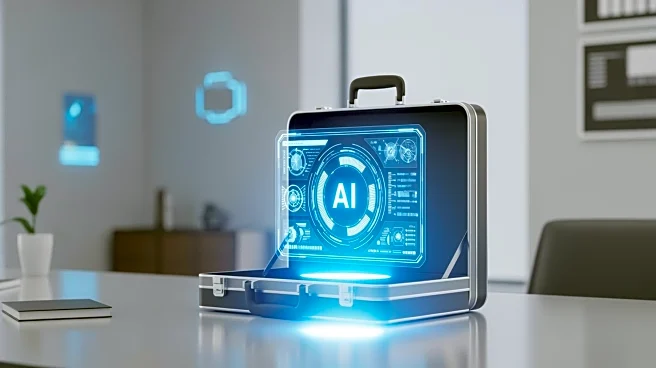What's Happening?
Gabriela Flax, a career coach, emphasizes the importance of discussing AI during job interviews to demonstrate how candidates can enhance their work performance. Flax identifies three key strategies for integrating
AI into work processes: amplify, automate, and architect. Amplifying involves using AI to enhance natural strengths, such as employing AI tools to generate content ideas or analyze data. Automating refers to offloading repetitive tasks to AI, allowing individuals to focus on more strategic aspects of their roles. Architecting involves designing systems with AI to streamline operations, even without a technical background. Flax encourages job seekers to approach interviews as brainstorming sessions, presenting AI solutions to potential employers to address current challenges.
Why It's Important?
The integration of AI in job interviews reflects the growing significance of technology in the workplace. By demonstrating AI proficiency, candidates can position themselves as forward-thinking and adaptable, qualities highly valued in today's job market. This approach not only showcases technical skills but also highlights strategic thinking and problem-solving abilities. As AI continues to evolve, its role in enhancing productivity and efficiency becomes increasingly critical. Employers are likely to favor candidates who can leverage AI to achieve better results, faster processes, and cost-effective solutions, thereby gaining a competitive edge in hiring decisions.
What's Next?
Candidates who effectively communicate their AI strategies during interviews may set themselves apart from others, potentially leading to more job offers and career advancement opportunities. As AI tools become more sophisticated, job seekers will need to continuously update their skills and knowledge to remain competitive. Companies may also begin to prioritize AI literacy in their hiring criteria, prompting educational institutions and training programs to focus more on AI-related skills. This shift could lead to broader changes in workforce development and employment practices, emphasizing the importance of technology integration across various industries.
Beyond the Headlines
The emphasis on AI in job interviews highlights broader societal shifts towards automation and digital transformation. As AI becomes more integrated into daily work routines, ethical considerations regarding data privacy and the potential displacement of jobs may arise. Additionally, the cultural impact of AI on workplace dynamics, such as collaboration and communication, could lead to new norms and practices. Understanding these implications will be crucial for both employees and employers as they navigate the evolving landscape of work.









